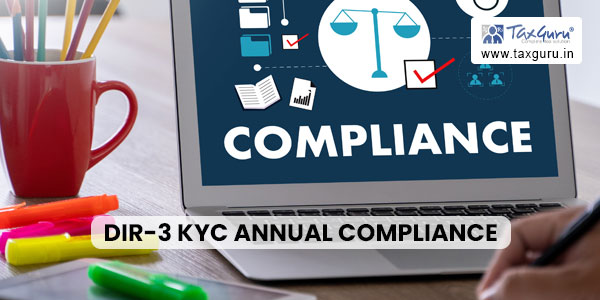Introduction
The Ministry of Corporate Affairs (MCA), India, in 2018, launched the DIR-3 KYC compliance mandate to bolster transparency in the Indian corporate scenario. This regulation is concerned with the Know Your Customer (KYC) norms for directors of all companies registered in India. It is now an integral part of India’s compliance landscape, and directors of companies must understand its implications thoroughly. From the Financial Year 2019-20 onwards, it is mandatory for every director who has been allotted a DIN on or before the end of the financial year and whose DIN is in approved status, will have to file form DIR-3 KYC before 30th September of the immediately next financial year.
Also Read: FAQs on DIR-3 KYC
Page Contents
What is DIR-3 KYC?
In an attempt to eliminate fraudulent activities, the MCA issued the DIR-3 KYC form. It mandates that every director who has been assigned a Director Identification Number (DIN) as on 31st March of a financial year must submit their KYC details to the MCA.
The aim of the DIR-3 KYC compliance is to maintain an up-to-date database of all individuals in directorial positions in Indian companies, which will, in turn, enhance the accountability and transparency of these companies.
The MCA provides two methods of filing the KYC, each catering to different scenarios – the DIR-3 KYC Form and the DIR-3 KYC Web.
1. DIR-3 KYC Form
The DIR-3 KYC Form is a more comprehensive KYC procedure and is required to be filed when:
1. A director is filing their KYC for the first time.
2. There have been changes to the director’s details since the last filing.
The form demands detailed information about the director, including proof of identity and proof of address, which needs to be self-attested by the director and then certified by a practicing professional (like a Chartered Accountant, Company Secretary, or Cost and Management Accountant).
The form allows for updates to significant details, such as changes in the director’s passport number, residential or permanent address, mobile number, and other relevant data.

2. DIR-3 KYC Web
The DIR-3 KYC Web service is a less complicated and more streamlined version of the traditional KYC process. This web-based service allows directors to confirm their details as stored in the MCA’s database via a straightforward online verification process.
After the initial DIR-3 KYC Form has been filed, directors can utilize the web service for subsequent years. This system operates based on the principle that the director’s details will not have changed since the last filing. Hence, it merely requires the directors to verify their existing information via an OTP sent to their registered mobile number and email ID. The process, thus, eliminates the need for uploading and verifying additional documents each year.
What are the Requirements of DIR-3 KYC?
The required details for DIR-3 KYC include personal information like the director’s full name, father’s name, date of birth, and personal identification details like PAN (for Indian nationals) or Passport (for foreign nationals).
Other mandatory details include address, email ID, and phone number. The directors are also required to provide details about their nationality and citizenship status.
In addition to the personal details, the form requires several documents to be attached. This includes:
- Proof of Identity: Self-attested PAN card copy (for Indian citizens) or passport (for foreigners).
- Proof of Address: Recent utility bill, bank statement, or property tax receipt.
- Other Attachments: Personal mobile number and email ID, which will be verified through OTP.
What is the Process of DIR-3 KYC Compliance?
The DIR-3 KYC form must be filled out online, either by the director themselves or by a professional on behalf of the director. The form is then digitally signed by a Chartered Accountant (CA), Company Secretary (CS), or Cost and Management Accountant (CMA) in practice.
Once the form is filled out, it is to be submitted electronically on the MCA website. On successful submission of the form, an acknowledgement will be generated, indicating the completion of the process.
It’s important to note that the DIR-3 KYC needs to be filed annually on or before 30th September of the immediately subsequent financial year. Failure to comply with the regulation could lead to deactivation of the DIN, followed by hefty penalty charges.
What is the Due Date for filing DIR-3 KYC Form for the Financial Year 2022-23?
| E Form | Purpose of Form | Timeline | Due Date | Remark |
| DIR-3 KYC Form | KYC of Directors | Annual Compliance | 30th September 2023 | Every individual who holds DIN as of 31st March 2023 and who has not filed DIR 3 KYC form previously or there is a change in director’s passport number, residential or permanent address, mobile number, and other relevant data. |
| DIR-3 KYC Web | KYC of Directors | Annual Compliance | 30th September 2023 | Every individual who has previously filed DIR-3 KYC Form and there is no change in email id and mobile number. |
What are the consequences of Non-Compliance?
Non-compliance with the DIR-3 KYC regulation may lead to the deactivation of the director’s DIN, which can severely impact their ability to participate in the management of the company. A deactivated DIN implies that the director cannot sign any legal documentation on behalf of the company.
Further, reactivation of the DIN is not straightforward and involves a fine. The deactivation can only be revoked after submission of the due KYC information along with a penalty of Rs 5000.
******
I believe this article has provided you with a clear understanding of the Annual KYC Compliance requirements for Directors. Should you have any further inquiries, or if you are seeking professional assistance with the annual KYC compliance process for directors, feel free to contact me at mayank.jha@outlook.com.





